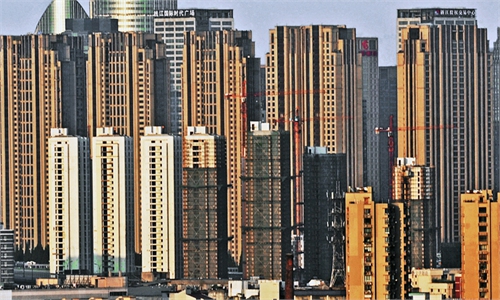China to overhaul housing market
Pilot property tax plan to curb speculation, systemic risks, experts say

real estate Photo:Xinhua
China's decision to pilot five-year property tax levies in selected cities on Saturday drew wide attention and discussion, including reportedly resistance hyped up by some Western media outlets. However, Chinese experts said on Sunday that the new move will help ensure stable growth of China's economy and real estate market in the long run, as the country seeks to curb housing speculation, distribute wealth more evenly and pursue common prosperity for all, dismissing claims that a housing market collapse is looming.The pilot program, one of the most profound changes to China's real estate market after decades of reshaping, is neither a signal of a crackdown on the country's housing market nor an obstacle to its economic growth, experts said. Instead, it is for the purpose of guiding rational consumption of housing and economical use of land resources to promote the steady and sound development of China's real estate market.
The Standing Committee of the National People's Congress (NPC), China's top legislature, adopted the decision on Saturday to authorize the State Council, China's cabinet, to pilot property tax reforms in some regions, according to a report by the Xinhua News Agency. The pilot program will run for five years, and the governments of the pilot areas will come up with detailed implementation rules, said the report.
How to make the property tax acceptable to middle-class families in China and make them feel the positive impacts as soon as possible is the key to the success of the pilot program, but housing prices will never plunge in China as the country would not allow the introduction of a property tax reform possibly leading to the collapse of its real estate market, experts said.
The property tax in the pilot areas will be levied on all types of real estate, including residential and non-residential properties, excluding legally owned rural houses.
Previous property tax pilot programs only applied to houses, but the latest one will cover state-owned land for construction purposes, Yan Yuejin, research director at Shanghai-based E-house China R&D Institute, told the Global Times on Sunday.
The wealthy province of Zhejiang in East China, tech hub Shenzhen in South China's Guangdong Province and the southern island province of Hainan which is developing free trade businesses are expected to join the pilot program, Yan predicted.
"Zhejiang is very likely to be included in the program as the province is aiming to building itself into a pilot zone for common prosperity by 2025, so it would have good foundation and demonstration effect to be included in the trial," he said.
The property-tax rate may vary depending on region and the size of properties, and the pilot regions may come from different parts of China with different development levels, experts predicted.
Systematic experience must be gained within five years to support legislation for a nationwide property tax, Jia Kang, director of China Academy of New Supply-side Economics, told the Global Times on Sunday.
Since 2011, the Chinese central government has explored levying taxes on high-end private residential properties in Shanghai and Chongqing, two mega metropolises. Since then there has been much discussion of expanding the tests nationwide, though little progress has been announced to date, as many local governments are reluctant to push such a tax out of worries that the property taxation will cause property values to drop, and dampen market demand for land - a crucial source of local government revenues.
"The upcoming pilot program, with a clear timeline, is a mid-to-long-term arrangement, showing a proactive and prudent attitude taken by the central government on real estate reform," Jia said.
Impacts to real estate market
For many years, runaway housing prices have put a great financial burden on Chinese families.
In 2020, the total market value of China's housing was around at $62.6 trillion, nearly double of that of the US ($33.6 trillion) and six times of that of Japan ($10.8 trillion), according to statistics by Chinese economist Ren Zeping's team.
Experts believed the property tax may finally tame the spiking house prices in China.
In the short run, the introduction of property tax will bring down home prices in some big cities, Lian Ping, head of Zhixin Investment Research Institute, told the Global Times on Sunday, adding that some owners with multiple houses already started selling properties in recent days.
"Selling properties on a large scale will not happen in China, as most people buy houses for residential uses instead of speculation," Lian noted, predicting the property tax would be rolled out with a "mild force and less rigid rules" to ensure there would be little negative impact on China's economy.
In the US, the effective property tax rate nationwide is 1.1 percent of the average home value. Japan levies around 1.7 percent, according to the USA Today.
Dismissing misinterpretation of the property tax pilot program, Tian Yun, former vice director of the Beijing Economic Operation Association, said the program is not a crackdown on China's real estate market amid the ongoing Evergrande debt crisis.
"Chinese officials are very clear about the significance of the real estate industry to China's economy. Detailed arrangements on financial security have been written in the country's 14th Five-Year Plan (2021-25)," Tian said.
Risks in China's housing market remain overall controllable despite individual problems that have arisen, Chinese Vice Premier Liu He said at the annual Financial Street Forum held in Beijing on Wednesday.
Yi Gang, governor of the People's Bank of China (PBC), the country's central bank, also spelled out moves to handle the individual case of the Evergrande debt crisis, including avoiding the spread of the Evergrande risk into other property firms and keeping the risk from feeding into financial markets.
Evergrande owes about $300 billion, with one-third of that falling under financial liabilities. This, adding to the diverse creditors and collateral Evergrande has offered for its debts, suggests that the spillover of the Evergrande incident on the financial sector is under control, according to Yi the PBC governor.
As a result, "it would be more proper to understand the property tax pilot program from the perspective of guarding against systemic financial risks, making improvements to achieve common prosperity and equal distribution," Tian told the Global Times.
Levying property taxes based on people's housing ownership could help reach common prosperity, he noted, because most of the expensive houses in China's first-tier cities are owned by wealthy people.
"This would also help solve the problems for local governments which depend heavily on land sales for income to find more sustainable income sources," Tian said, looking at the property tax as a restructuring of local fiscal and tax income.
However, to what extent the property tax could bring down house prices in metropolitan cities is to be observed, because the deep-rooted problem in a fast-urbanizing China is the imbalance between house supply and demand in certain cities, experts agreed.
The property tax is unlikely to let house prices in first tier cities such as Beijing and Shanghai deviate from a long-term upward curve during the high-speed urbanization in China, but it will reduce the slope and amplitude of this curve, and especially curb unscrupulous speculation, Jia said.
Meanwhile, the property tax will help optimize income distribution and property allocation, experts noted.
"At present, there is a wide gap in house allocation. Some people have dozens or even hundreds of houses, while some can't even fulfill their basic housing requirements," Jia said.
"We should give full play to the role of property tax in preventing and suppressing speculation, reducing the vacancy rate, adjusting income distribution and property allocation, and curbing the polarization of income disparity," he noted.




